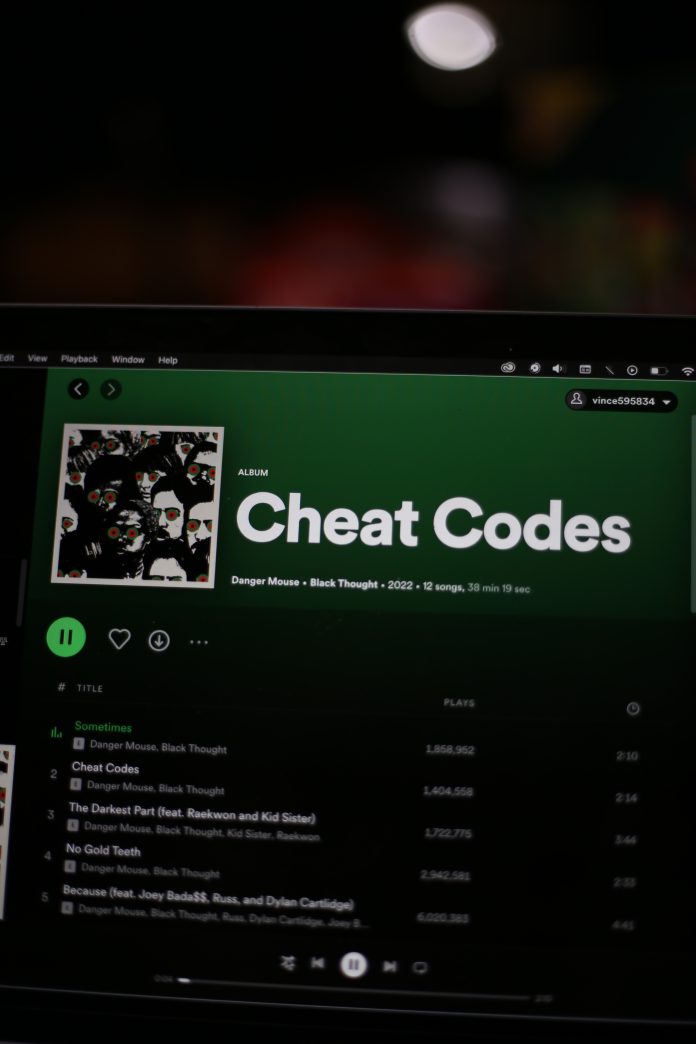Andy Knox
Arts & Entertainment Editor
The abstract hip hop of the ‘90s, pioneered by groups like Del The Funky Homosapien’s Hieroglyphics, and A Tribe Called Quest, sounds very different from that of the genre’s current top artists like Earl Sweatshirt and Aesop Rock. With his ceaseless history of pushing himself to be on the level of contemporary greats in the subgenre, Black Thought is strong proof that it has made progress. Produced by Danger Mouse, his new album, Cheat Codes provides more evidence for this progress.
Though he is one of the lesser-known MCs to the current generation of hip hop fans, those aware of Black Thought know him as one of the most skilled, consistent active rappers in the game. When he releases an album, fans are right to expect each verse to be filled with top-notch lyricism from one of the most slept-on rappers of all time. Still performing with his now over-30-year-old band The Roots, Black Thought has only been releasing solo music since 2018, when he released the first of three Streams of Thought records.
Three years after its release, Black Thought has doubled back on the tweaks he made to his brand on the cleaner, more conformist and upbeat Streams of Thought, Vol. 3, returning to the more boom bap, soul sampling, and grimy production from his first two works. Black Thought did well with his poppy hooks and relationship issues, but long-time fans should be happy to see him back in his lane.
The most surprising aspect is the features — Black Thought has bigger names than ever on this project. Great rappers like Raekwon, Joey Bada$$, A$AP Rocky and Run the Jewels each give strong verses that match Black Thought’s energy while remaining true to themselves. Kid Sister and Michael Kiwanuka each deliver passionate soulful, old-timey hooks on “The Darkest Part” and “Aquamarine” respectively. Given Black Thought’s relative popularity, bigger names’ interest in collaborating with him points to the massive amount of respect he has rightfully earned.
On the production side, Danger Mouse skillfully toes the line balancing Black Thought’s old school boom bap sound while making each beat perfect for who featured. “Saltwater,” featuring Conway the Machine, meets smack dab in the middle of Black Thought’s old school swagger and the ominous grime of a typical Griselda track. Instead of a hook, the backing track repeats a short instrumental breakdown to separate each verse, though Conway adds repetition in a unique way.
His opening bars, “They heard me rhymin’, they wanna know where they find me at / The grimy cat from the May Street trenches, insomniac,” are so catchy that he decides halfway through his verse to repeat them. The best part is Conway’s slick introduction of the pseudo-hook: “hold up, rewind me back.”
The smooth style blending continues with the starry dinge of “Belize” working to cultivate the ideal listening conditions for an MF DOOM feature. It is so crunchy and DOOM’s callbacks to his quirky 2004 Adult Swim-themed collaboration with Danger Mouse communicate that this is what DOOM would have wanted.
Bars after bars like “Hated the rap sound / Debated the crap until he felt he had it mapped out / Enough to have the game trapped and bound / Scratchin’ the crown with the names of lames who yapped the noun” serve as more reminders that DOOM is forever a one-of-a-kind rapper.
Though every track is a strong standalone — and they even blend together smoothly enough — at the end of the nearly 40-minute album, listeners know little new about Black Thought. Anyone who has heard one of his projects knows he is a consistently solid old school lyricist who powerfully delivers creative bars, but the meaning can be so hard to track and all over the place that on tracks including “Sometimes” and “Violas and Lupitas” fail to have much impact beyond a good, “Wow. That’s impressive.”
Black Thought seems to get a bit deeper on “Identical Deaths,” talking some about his substance abuse issues but his style, full of dramatic, biblical imagery and focus on inspiration, makes him sound less relatable and emotional than the topic might grant. His style lends itself much better to detailing societal problems than it does to his personal life. His self-comparisons to historical figures like Saladin as he fights to save the rap game also just feel … incorrect. He may view his journey to keep classical hip hop at the genre’s forefront as an honorable one, but if he thinks his battle is anything except losing, then he is wildly out-of-touch.
While that and lines like “[c]ommon sense isn’t what they teachin’ at colleges” may date him, Black Thought probably doesn’t care the he sounds kind old; he knows he’s cool. Anyone who can write the line, “Theologians point to the trap house that God is in / Go on, take his name in vain, like a phlebotomist,” deserves the highest levels of confidence. Aside from the few beats here that get a bit beepy, Danger Mouse delivers the perfect production style and execution for Black Thought. The two have unlocked the cheat codes for success in their lane.











